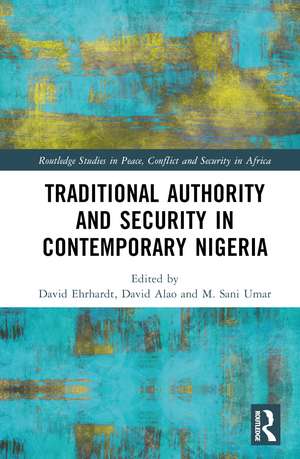Traditional Authority and Security in Contemporary Nigeria: Routledge Studies in Peace, Conflict and Security in Africa
Editat de David Ehrhardt, David Oladimeji Alao, M. Sani Umaren Limba Engleză Hardback – 16 noi 2023
Set against a backdrop of widespread security threats – including insurgency, land disputes, communal violence, regional independence movements, and widespread criminal activities – perhaps more than ever before, Nigeria’s conventional security infrastructure seems ill-equipped for the job. This book offers a fresh, empirical analysis of the roles of traditional authorities – including kings, Ezes, Obas, and Emirs – who are often hailed as potent alternatives to the state in security governance. It complicates the assumption that these traditional leaders, by virtue of their customary legitimacy and popular roots, are singularly effective in preventing and managing violence. Instead, in exploring their creative adaptation to governance roles after a dramatic postcolonial downturn, this book argues that traditional leaders can augment, but not substitute, the state in addressing insecurity.
This book’s in-depth analysis will be of interest to researchers and policy makers across African and security studies, political science, anthropology, and development.
The Open Access version of this book, available at http://www.taylorfrancis.com, has been made available under a Creative Commons Attribution-Non Commercial-No Derivatives (CC-BY-NC-ND) 4.0 license.
Din seria Routledge Studies in Peace, Conflict and Security in Africa
-
 Preț: 379.68 lei
Preț: 379.68 lei -
 Preț: 383.12 lei
Preț: 383.12 lei -
 Preț: 384.86 lei
Preț: 384.86 lei -
 Preț: 365.91 lei
Preț: 365.91 lei -
 Preț: 387.91 lei
Preț: 387.91 lei -
 Preț: 393.90 lei
Preț: 393.90 lei -
 Preț: 312.54 lei
Preț: 312.54 lei - 18%
 Preț: 1000.27 lei
Preț: 1000.27 lei -
 Preț: 385.71 lei
Preț: 385.71 lei - 18%
 Preț: 1003.89 lei
Preț: 1003.89 lei -
 Preț: 395.90 lei
Preț: 395.90 lei -
 Preț: 389.66 lei
Preț: 389.66 lei -
 Preț: 389.66 lei
Preț: 389.66 lei - 18%
 Preț: 1009.11 lei
Preț: 1009.11 lei - 18%
 Preț: 949.60 lei
Preț: 949.60 lei - 18%
 Preț: 1001.87 lei
Preț: 1001.87 lei - 18%
 Preț: 999.51 lei
Preț: 999.51 lei - 31%
 Preț: 766.24 lei
Preț: 766.24 lei - 30%
 Preț: 768.36 lei
Preț: 768.36 lei
Preț: 1005.97 lei
Preț vechi: 1226.80 lei
-18% Nou
Puncte Express: 1509
Preț estimativ în valută:
192.49€ • 201.55$ • 159.66£
192.49€ • 201.55$ • 159.66£
Carte tipărită la comandă
Livrare economică 09-23 aprilie
Preluare comenzi: 021 569.72.76
Specificații
ISBN-13: 9781032550190
ISBN-10: 1032550198
Pagini: 246
Ilustrații: 12 Tables, black and white; 12 Line drawings, black and white; 7 Halftones, black and white; 19 Illustrations, black and white
Dimensiuni: 156 x 234 x 19 mm
Greutate: 0.62 kg
Ediția:1
Editura: Taylor & Francis
Colecția Routledge
Seria Routledge Studies in Peace, Conflict and Security in Africa
Locul publicării:Oxford, United Kingdom
ISBN-10: 1032550198
Pagini: 246
Ilustrații: 12 Tables, black and white; 12 Line drawings, black and white; 7 Halftones, black and white; 19 Illustrations, black and white
Dimensiuni: 156 x 234 x 19 mm
Greutate: 0.62 kg
Ediția:1
Editura: Taylor & Francis
Colecția Routledge
Seria Routledge Studies in Peace, Conflict and Security in Africa
Locul publicării:Oxford, United Kingdom
Public țintă
Academic and PostgraduateNotă biografică
David Ehrhardt is Associate Professor of International Development at Leiden University, The Netherlands. His main research interests are African governance and educational innovation. David has published extensively on Nigeria and co-leads the Learning Mindset innovation project. He recently co-edited a Special Issue in the Journal of International Development on brokerage, development, and conflict.
ORCID ID: 0000-0002-9159-3838
David Oladimeji Alao is a Professor in the Department of Political Science and Public Administration, and Chief of Staff to the President/Vice Chancellor, Babcock University, Ogun State, Nigeria. Prof. Alao has authored several articles and 3 edited books.
ORCID ID: 0000-0001-9158-8900
M. Sani Umar is a professor in the Department of History and Diplomatic Studies, University of Abuja, Nigeria. His research centres on religious violence and peace building, with a focus on understanding the roots of religious conflict and the dynamics of religious pluralism.
ORCID ID: 0000-0002-9159-3838
David Oladimeji Alao is a Professor in the Department of Political Science and Public Administration, and Chief of Staff to the President/Vice Chancellor, Babcock University, Ogun State, Nigeria. Prof. Alao has authored several articles and 3 edited books.
ORCID ID: 0000-0001-9158-8900
M. Sani Umar is a professor in the Department of History and Diplomatic Studies, University of Abuja, Nigeria. His research centres on religious violence and peace building, with a focus on understanding the roots of religious conflict and the dynamics of religious pluralism.
Cuprins
Introduction 1. Traditional authority, security governance, and Nigerian agency Part I: Continuity and Change 2. Assessing the capacity of traditional institutions and authorities in maintaining security and peace: A historical perspective 3. The changing roles of traditional authorities in security management: A case-study of the Benin area of Edo State 4. Female traditional institutions and the travails of conflict management, peace, and security in Ekiti society 5. The diminishing relevance of traditional rulers and securitization in the South West 6. The changing roles of traditional authorities in conflict, security and peacebuilding in Katagum and Misau Emirate Councils in Bauchi State Part II: Contemporary Problems and Solutions 7. Importing militant jihadists: Analysing the response of traditional authorities to Muslim youth extremism in the Nigeria-Niger border areas of Sokoto State 8. Traditional institutions and the management of herders-farmers conflicts in Nasarawa State 9. Traditional rulers and the Amotekun Regional Security Network in the South West 10. Traditional authority and grassroots’ peace-building mechanisms in Lagos 11. Politicisation of the appointment of traditional rulers and the challenges of conflict and security management in Umuahia, Abia State Conclusion 12. Creative genius in postcolonial Nigeria: Re-imagining traditional rulership at a safe distance from politics
Descriere
Exploring the contentious landscape of Nigeria's escalating violence, this book describes the changing roles of traditional authorities in combatting contemporary security challenges. With in-depth analysis the book will interest researchers and policy makers of African, devlopment and security studies, political science and anthropology.
